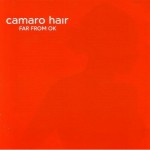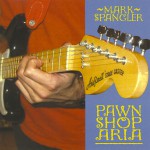 Camaro Hair
Camaro Hair
Far From O.K.
Contraband Recordings
Though they formed in 1998, this six-song EP is the only second release from this ambitious pop quartet, who are led by singer/songwriter Brian Sicotte and ably abetted by scene veteran Rob Daiker. The band played at South By Southwest in 2000 and have made some headway in the dismal local live music scene. But, this might not be the right time nor place for an ensemble of this fine feck and fettle. They deserve better than Portland.
The band accurately cites Bowie, the Beatles, My Bloody Valentine, Led Zeppelin and Cheap Trick as influences, although, rather than musical, the Zep thing might be more of a pedagogic or spiritual reference. The Flaming Lips, Oasis, early Elton John, World Party and the British bands the Bevis Frond and the Divine Comedy also come to mind. Whatever the case, this is accessible, well-written, well-played music, constructed by dedicated pop artisans, who are in complete control of their craft.
Familiar piano chords, alternating between Gmin9 and C7, punctuate the verses of “At My Worst.” Sicotte’s plaintive vocal is buoyed by bassist Mike Johnson’s upliftingly orchestral keyboard accompaniment in the lovely chorus and haunting bridge. Daiker’s slide guitar glissades in the bridges are especially tasty. Vocally, Sicotte could be mistaken for Oasis’ Liam Gallagher. The lyric, a soul-searching quest for identity and self-awareness, satisfies as more than mere superficial fluff; intelligent and lacking self-pity. A fine piece of workmanship, this song could be a hit.
Mike Johnson supplies punchy bass and rich piano flourishes to “Disaster,” as his brother, drummer Kevin Johnson, lays down a solid foundation beneath Sicotte‘s frothy acoustic guitar and quiet, hymn-like vocals. Daiker’s Edge-like chortling guitar fills add nice accents to the instantly memorable chorus. Though points must be given for an attempt at an exotic turn, the bridge could use a just bit of tightening. Still, this song has viable hit qualities as well.
A pretty C-Cmaj7-D6/9 chord progression on acoustic guitar is at the crux of “With No One.” Mike Johnson’s supple bass lines pinion Daiker’s ghostly guitar transmissions against Sicotte’s fragile acoustic guitar embellishments. A hint of the hymnody found on the Queen/Bowie single “(Under)Pressure” hovers around the mood of this song. Again, with its eminently listenable appeal, an impressive, well-hewn chorus is sure to catch the ear.
Jangling, open-string electric guitar flailure powers the Cheap Trickish “Marathon.” Sicotte, sounding very similar to Robin Zander, here, emotes effectively against a wall of sound created by the synchronous phantasmagoric movements of Daiker’s wraith-like guitar, with the urgent rumble of Mike Johnson’s bass. A riveting, highly-charged instrumental section in the middle is absolutely fantastic. Yet another significant performance. Robust.
The lush, open chords decorating Sicotte’s acoustic guitar intro to “Subliminal Tank,” as well as his winsome vocal, recalls Arthur Lee and the seminal ‘60s band Love. Here the band seem unable to fully integrate behind him. Daiker’s slide guitar accompaniment, very similar to the successful backing he lent to the first cut, here, simply fails to satisfy. Instead, the notes seem sloppy, the arrangement not entirely thought out. But, in other places on the song, he positively shines.
The textural possibilities presented by the indistinct harmonic relationships created within Sicotte’s rather nebulous chord progression (something like E9-G5-C9-Am9), are not fully explored, nor particularly well-executed. Still it’s a very nice song, with much to recommend it. The band’s unerring ability to fashion densely exquisite sonic environments, in a manner similar to My Bloody Valentine is, yet again, a prominent feature of this song, as well.
“Fight The Nothings” is probably the most straight-ahead of the half-dozen songs presented here. Again, the pop production values of Cheap Trick loom large in the arrangement of this song, as does Kevin Shields of My Bloody Valentine, as if he were standing in with Rick Nielsen and the boys.
Ala Shields, Daiker shows a pastry chef’s knack for applying thick layers of guitar frosting. Meanwhile, drummer Kevin Johnson provides a heavier, Bun E. Carlos-style backbeat, with bassist Mike Johnson acting as the thread, whose liquid tensility ties together the two disparate techniques. Even a slight flavor of the Beatles runs through the major-to-minor chord change near the end of the song.
Camaro Hair prove themselves to be more than capable of cobbling together reliable hooks and sturdy riffs. Each member of the band brings to the table a host of assets. Sicotte is a talented front man, and a gifted songwriter of considerable potential. This band has everything it takes to succeed. It would seem that it is really only a matter of time before they find a much wider audience.
Pawn Shop Aria
Alice Street Records
It’s been exactly two years since Mark “Sparky” Spangler’s last album. His January 2001 release Don’t Go In The Basement, was a homegrown affair, which exhibited a lot of harmless charm in its own sort of self-effacing way. This release is more of the same; although the presentation seems a bit more focused here, if still a bit ragged around the edges.
For those who don’t know (or don’t care) about the history of the Portland music scene, Mark was a card-carrying member of Johnny and the Distractions back in the early ‘80s, playing with leader Jon Koonce in many other musical configurations over the years since the band’s demise. Here, with the help of drummer Kip Richardson, who played with Mark in the Distractions, way back when, returns again for this effort, after guesting on Mark’s first album as well.
As before, the influences range from the twang of Petty to the clang of Neil Young. And again Mark Knopfler’s concise phrasing seems to have had a lasting effect upon Spangler’s lead guitar work, as he exhibit’s a similar sense of economy in his playing; as well some sonic correspondences, which center around the employment of a Fender Stratocaster. The “Pawn Shop Aria” to which the album title refers, apparently, in reality, an Aria Pro II (“Stage Caster”” in this case) Strat copy, appears to be Mark’s axe of choice. He makes his sound a lot like a real Strat, so whatever.
Anyway, in addition to the aforementioned influences, one can hear a Warren Zevon-ish tremulousness in Mark’s vocal presentation in several places, as well as a forthright, Bruce Cockburn-like delivery on a song or two. Even a John Hiatt-like feel creeps in here and there. As with his previous release, Mark displays a dry sense of humor on a number of tunes.
Something of a revelation with this effort, is Mark’s newfound penchant for noodling around on the guitar for a minute or two before getting into a song. He must have a lot of extra tape/memory (choose your medium, analog or digital), or something. Anyway, sometimes those aimless preliminary interludes sound like a waste of perfectly good silence. But otherwise, this is another fun outing from Mark Spangler, even better than his inaugural effort from a couple of years ago.
The title track, an instrumental, of course, demonstrates what just the pawnshop Aria in question (in the right hands) can do. Mark puts it through it’s paces, demonstrating an adroitly crisp technique: elegant fret-work coupled with some awesomely skillful finger picking. Evoking Roy Buchanan, Joe Satriani and Eric Johnson at various times, as well as Knopfler, Mark displays a superior knowledge of what his instrument can do, utilizing it with delightful artistic prudence and concision.
Though “Silicon Girl” gets the word mixed up, the point still gets across. In describing the tale of a girl with serious esteem issues, Mark inadvertently refers to silicon, the crystals of which are grown to create computer chips. What Mark means to refer to in his song is silicone, the gelatinous substance inside the implants that many women use to enhance and fortify what they considered to be insufficient breasts. Hopefully, the day will come when women will no longer feel compelled to augment their bodies by mutilating them, which is pretty much the point of Mark’s song.
Musically, the song has a lot in common with Tom Petty’s early hit, “Here Comes My Girl.” Over blustery electric guitars and Richardson’s hard-hitting drum reports, Mark intones a spoken word passage before diving into each verse. “Raised up on Barbie dolls and fashion magazines/You can’t really blame her now, if she wants to be a silicon girl.” So there you go.
With vocal phrasing in the verses, that sounds a bit like latter-day Eric Clapton, and a lot like Warren Zevon (who, tragically, has been recently diagnosed with terminal lung cancer), “Great Vibration” succeeds with a Byrdsian chorus and a Pettyish bridge. “Polka Hero” is an inane piece of frivolity, that take’s the old song, “You ought to be a football hero/To get along with the beautiful girls,” a step further, with Mark adding a nice slacker slant to his peculiar world view, quoting Rodney King along the way. Twisted. Yee haw!
Coming in at nearly ten minutes long, the mini-epic “Mystical” would be a long song without the two-minutes of guitar pedantry that precedes the actual song. It sounds like he is waiting (in a multi-track log jam) for the drum machine track to kick in. The result is similar to some minimalist soup that avant rock guitarist Sandy Bull was trying to concoct in the late ‘60s.
Once the song finally gets under way, it’s a bit of a train-tempoed number, with Mark again talking the verses, launching into a Bruce Cockburn-like treatise on the state of the union. “Bullets fly, bombs explode/While politicians speak in code/Sometimes it feels like the inmates are running the asylum/The hidden words are now revealed/All the books they are unsealed/The best beloved thing in the sight of God is justice.”
Some wonderful instrumental sections ensue (especially the truly cosmic finale), which are far beyond the initial meanderings, leading one to wonder even more about the necessity of the inclusion of first two minutes. Perhaps there is a “mystical” explanation.
“Cheetah, Boy and Jane” is a good-natured send-up that finds the title trio holed up “in a duplex in Tarzana” (get it?). “The Blues According To Me,” is a JJ Cale meets Bob Dylan sort of number (think of a speeded up version of Dire Straits’ “Six Blade Knife”) that leaves ample room for Mark to showcase his abundant talents on that “pawn shop Aria.”
The eighth, and final track (the ninth cut is only a minute long) “Harsh Mistress,” is a bitter little ditty about the dangers of loving the wrong woman. A great chorus, with a magnificent, rambling bass line harkening to “Hey Joe,” calls to mind Bruce Springsteen in its dark deliberation.
As with its predecessor, this album again demonstrates Mark Spangler’s brilliance in many small ways. It is a tiny masterpiece. It’s piddling shortcomings (that pointless noodling) aside, it is a work of homegrown genius that deserves recognition. Several of these songs seem more than radio friendly (think KINK). Certainly Mark Spangler is deserving of a wider audience. He’s paid his dues, after all.
 Trophywife
Trophywife
Trophywife
Self-Produced
Trophywife have been around for about three years, one year in the present configuration. Their music, with a few exceptions (most notably their raucous cover of the Beatles’ “Back In The USSR”) is of the goose-step two-step uber alles variety. Descended directly from the lineage of original hardcore punks, such as DOA or Black Flag (particularly DOA) circa 1981, Trophywife have traded in the militant left-wing political stances of their predecessors for somewhat more mundane fare.
Where their ancestors may have directed their onslaughts toward government oligarchy and class warfare, Trophywife go after the Dandy Warhols (who seem like awfully easy targets for a punk band). It must be said however, that with songs such as “Peace Is Gone” and “Mirage,” the trio do seem to occasionally contemplate deeper social issues and with “Comeback” and “”So Long Screwy” even seem to touch on the subject of interpersonal relationships..
Still, the band is as tight as an oil drum and just as likely to pollute the environment. All three members of trio demonstrate journeyman-like knowledge of their instruments. Adhering to the punk tradition, all but three of the eleven (or fourteen) songs on this outing come in at less than two-minutes in length. The last song in the live medley at the very end, “Stopping The Violence,” clocks in at about forty-five seconds, but it certainly gets its point across.
The boys shave a good seventy seconds off of “Back In The USSR,” by playing it 80% faster than the original. It’s a faithful version, they don’t leave anything out, from the jet take-off sound at the start, to the searing solo in the center. They just cut through the song, as if they all had five cups of coffee before doing the take and are in one huge hurry to just be done with it. Pretty impressive. Obviously, by sprinting through every song at breakneck speed, there is not a lot of room for nuance and shading; but that too would appears to be a part of the musical landscape that the band traverses.
“Misplaced” seems to be concerned, lyrically, with some sort of immediate personal injustice, however it is difficult to ascertain, within the midst of the brouhaha. Dan Hawthorne’s slash and burn guitar tactics are matched, volley for volley, by Joe Frost’s torrid bass pace and Dylan Skiles’ frenetic, rapid-fire drums. “Peace Is Gone” seems to widen its world view a tad, although its hard to tell. There seem to be some references to bombs and war. They pull the old “start off real slow for sixteen bars before blasting out” trick. They do it pretty well.
A complete change of pace, “Comeback” circles around an Offspring sort of delivery, while lyrically delving into a softer, more sensitive side. As might be expected, they snap right out of it with “Mirage.” Frost’s double-time bass riff develops into a volcanic attack of the storm troopers. “So Long Screwy” is a two-minute sonic assault upon a relationship gone sour.
With the tag line “The Dandy’s might have been rock heroes to some/But they never meant shit to me,” “Ode To The Dandie Warhols” gives the impression that there might be some sort of axe to grind here, beyond mere differences of musical opinion. Typically, in situations such as this, there is a woman involved. Whatever the case, it’s another flamethrower of a song, as the lads sling some serious sludge, while bearing quite a grudge.
Now, “I Shit A Shih Tzu” takes another tack all together- verbally pummeling a next door neighbor for the lawn habits of the pet dog- all hell threatens to break loose. “ I swayh to gawd lady…” “Who’s Gonna Start It” is cut that seems to be looking for trouble, both from any immediate interpersonal relationships and from the world at large. The scuffling, hyperactive arrangement furthers this impression.
Trophywife get no points for subtlety. They are about as subtle as an asteroid striking the earth. However, they play very well together as a unit. While their music is certain to have no appeal to ballad lovers and acousti-cats, there is a place in rock music for what these lads do. And it seems likely that they are going to jackhammer their way to that place, come hell or high water.

